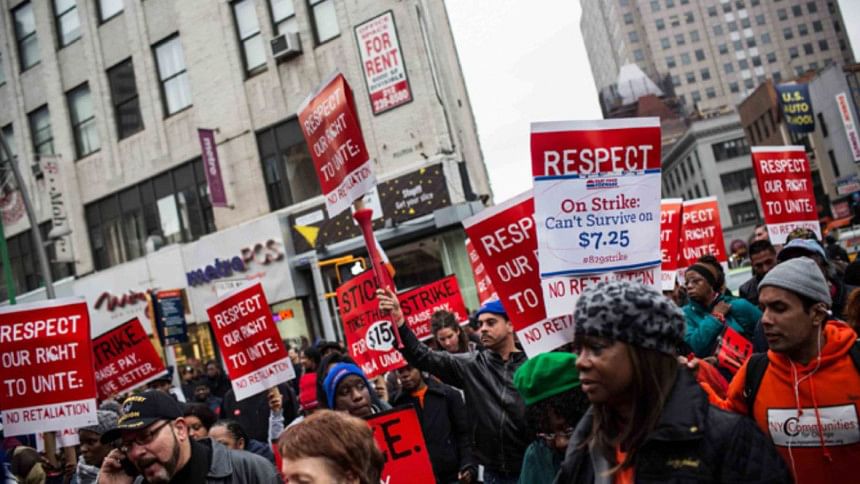Bangladesh can improve its labour rights, but so can the United States

RECENTLY, the Office of the United States Trade Representatives (USTR) called on the government of Bangladesh to improve on its labour rights, and in particular to allow for increased unionisation before it would consider restoring trade benefits. In Bangladesh, it now seems to be increasingly accepted that unionisation or some worker constituted collective will help to improve workplace standards. Of course, labour advocates have been arguing this for years, but Rana Plaza provides a tragic reminder that unions play a critical role in improving workplace safety and labour rights. Therefore, freedom of association has been a key criteria in Bangladesh's review on trade benefits. This is a welcome development.
While the US can use its trade stick to exact improved labour rights by suspending GSP it should also use its own legal, political and economic tools to make US employers and multinational companies compliant in enforcing its own labour laws and protect trade union activities both in the US and abroad. If this is not done, any efforts made by local and well-meaning garment owners in Bangladesh will be thwarted as US companies export labour injustice and continue to depress working conditions for workers in the US and maintain a supply chain that pays garment workers here sweatshop wages.
Economists rightly attribute the widening gulf between rich and poor in the US to the decline in unionisation. The working conditions in Bangladesh's garment industry, and the widening wage gap in the US present a unique opportunity for labour advocates across the Atlantic to make a strong, revived, coordinated fight for trade union rights. If the US trade representative believe trade union rights can help improve labour rights in Bangladesh, then, it can surely help workers in the US improve their economic conditions.
The carrot stick approach to Bangladesh can be forcefully applied in the US to improve labour standards. Companies like Walmart that source from factories in Bangladesh have a poor track record when it comes to labour rights in the US, yet, I see little regulation from US elected officials on its labour practices. In addition, recent US Supreme Court decisions have made it harder to organise workers, including cases like Harris v. Quinn which prohibits unions from collecting dues from public employees who did not want to join. The inability of unions to collect dues to perform its collective bargaining duties means weakened representation for all workers.
American elected officials should pass legislation that restores workers' ability to organise in the US. This is exactly what the government of Bangladesh was required to do for trade benefits in its comprehensive review of its own labour laws. Trade union rights were the New Deal bargain workers in the US made in exchange for industrial peace. In upholding this bargain, the US should similarly conduct a comprehensive review of its court decisions and laws that discourage unionisations, and pass necessary legislation to keep its bargain. While no economic sanctions can be placed on elected officials, they should be sanctioned through votes if they fail to take steps to improve workplace conditions for workers in the US.
In any request for licensing, tax incentives or permits, the US should require companies to provide an audit on labour compliance both domestically and abroad. Here, the US government can play a critical role to ensure that its companies do not violate accepted international human rights standards in the workplaces, both domestically and internationally. Internationally, we must hold our companies accountable for violations of human rights. Recently, Germany passed guidelines to hold its own businesses to human rights standards.
Labour organisers in Bangladesh have suggested that buyers source from factories that have a trade union or at the minimum an independent worker organisation. Such a proposal reminds me of the effort by American unions to encourage busineses to buy union-made products. Union-made can now be a global brand.
If America fails to hold its own companies accountable to human rights standards for its workers and for workers abroad, then, any pronouncements to improve labour standards will show the US at best as a hypocrite and worst, an economic bully.
Finally, there is a critical organising and political role that workers in the US can play at this moment in both by demanding not only their own right to organise using domestic channels, but also to demand trade union rights of their fellow workers in Bangladesh. Unions and worker organisaions need to be made a key part in the global supply chain, otherwise we will not see an improvement in labour standards globally.
The writer is a Senior Research Fellow with the American Institute for Bangladesh Studies (AIBS) examining the garment industry. Follow her on twitter @lawatthemargins

 For all latest news, follow The Daily Star's Google News channel.
For all latest news, follow The Daily Star's Google News channel. 



Comments